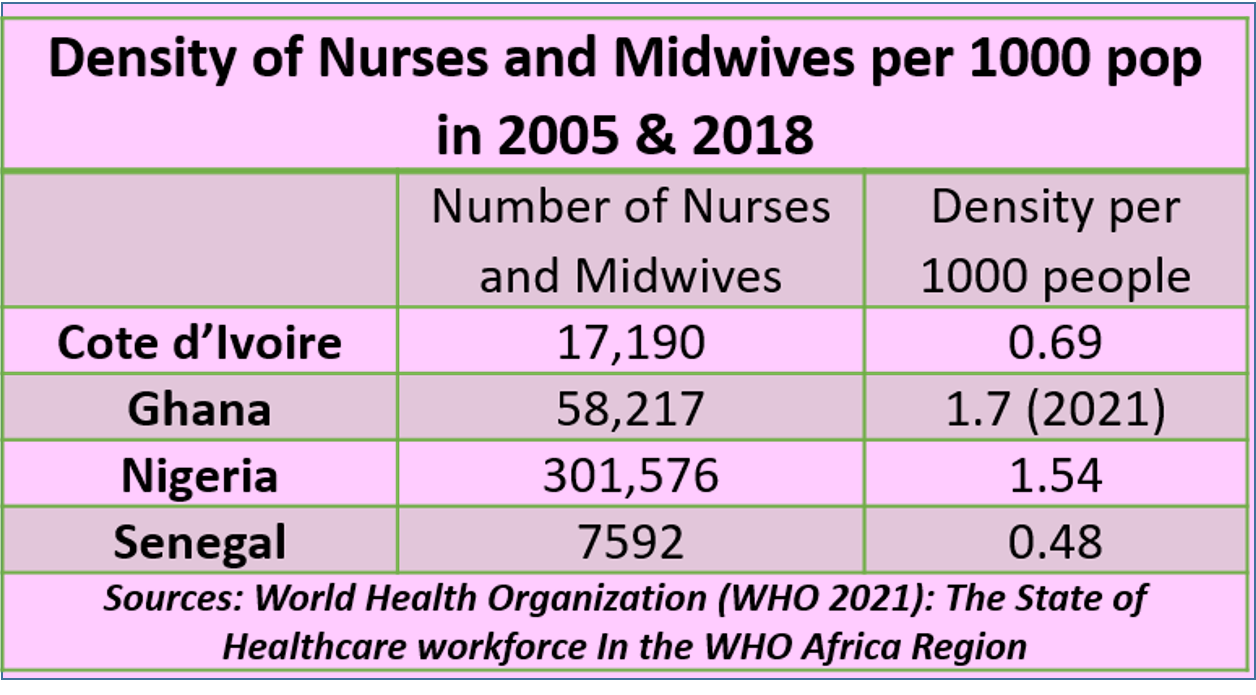Brain drain: Nurses and the temptation of exile
Helmut Umlauf, Köln, Germany
February 26, 2023
N urses are the backbone of Ghana’s health system. At the beginning of the Covid-19 pandemic in 2020, the government had a record of 58,217 registered nurses. The pandemic exposed the devastating consequences of staff shortage in the medical workforce. The government decided to close the gap. In the years that followed, the number of professional nurses including community health nurses on the government payroll increased from 58,217 (2021) to 62,643 (2022). By the end of 2024 Ghana will have 75,217 after successive special recruitment initiatives.
Since 2017, the nurse-to-population ratio has improved, according to the Ministry of Health. In 2021, it stood at (1 for 701 people), compared to 2019 (1 for 727 people). For the Ministry, this achievement exceeds the WHO recommended standard of 1 for 1,000. However, the ministry acknowledges, it needs to address other issues to be able to situation of nurses and midwives.
Comparative nurse-to-population ratio

Source: WHO, 2021
Figures from the Union of Professional Nurses and Midwives (UPNM) show that 15,784 nurses are members of the union. Over the past decade, the Union has seen a worrying trend in the migration of experienced nurses and midwives. They migrate to developed nations, such as the United States, the United Kingdom, Ireland, Australia, and the United Arab Emirates. Those who aspire to leave the country deplore low pay and poor working conditions. In Ghana, this exodus may lead to ‟negative impacts on public health infrastructure” according to empirical research from the University of Kassel Germany1.
Government initiatives to stem the outflow
Population Services International (PSI) says that migration has negative consequences on health service delivery 2. Since 2012, PSI has been assisting the State of Ghana to develop a system to mitigate the impact of this phenomenon. The government of Ghana responded by developing and rolling out strategies to stop migration. Today, the government says that it offers better training, and a structured career path. Under the new plans, nurses receive better salaries and housing loans. They also receive ‟rural bonuses” when they are posted in remote villages, a flexible ‟bonding scheme” (this is a full scholarship for nurses who agree to work with the government for the next five years after completing training). The government also promises new health management programs.
Another scheme that seeks the organized temporary migration, through a bilateral agreement with host countries. The aim is to give an opportunity for nurses and midwives to gain external exposure and experience. MIGNEX (Aligning Migration Management and the Migration–Development Nexus) funded a five-year research project (2018 to 2023) to pilot this scheme 3. MIGNEX sent 3,000 Ghanaian nurses to Germany in 2019, while in 2020, 95 nurses traveled to Barbados with a two-year contract. MIGNEX also explains that ‟the Government of Ghana has been involved in supporting this temporary and circular migration”. Since the launch of the scheme 300 nurses have spent two years in Barbados.
Adaptation initiatives
The government has hiked up training. In 2018, for example, 22 000 nurses and midwives completed training to be ready for employment by 20194. In 2024, another 15,000 will join nursing colleges around the country. Members of the diaspora have come up with other creative initiative to respond to the brain drain. In January 2023, Professor Yvonne Commodore-Mensah set up the Ghanaian-Diaspora Nursing Alliance (G-DNA)5. Commodore-Mensah is a Associate Professor at at Johns Hopkins School of Nursing (United States). The goal of the scheme is to facilitate collaboration between nurses in Ghana and their counterparts in the diaspora.
Related Articles
BIBLIOGRAPHY
1❩ Christa Wichterich (2024): To Stay or to Go? Outmigration of Nurses from Ghana - https://www.uni-kassel.de/forschung/files/Global_Partnership_Network/GPN_Working_Paper_No_04.pdf
2❩ https://www.world-psi.org/sites/default/files/documents/research/ghana.pdf
3❩ Leander Kandilige et al (2022): Migration-relevant policies in Ghana - November 2022 https://www.mignex.org/sites/default/files/2023-03/d053d-mbp-migration-relevant-policies-in-ghana-v1.pdf
4❩ James Avoka Asamani et al. (2020): The imperative of evidence-based health workforce planning and implementation:
lessons from nurses and midwives unemployment crisis in Ghana - https://www.ncbi.nlm.nih.gov/pmc/articles/PMC7059310/
#:~:text=In%202018%2C%20for%20example%2C%20it,the%20MOH%20see%20Table%20%E2%80%8B
4❩ https://g-dna.org/
